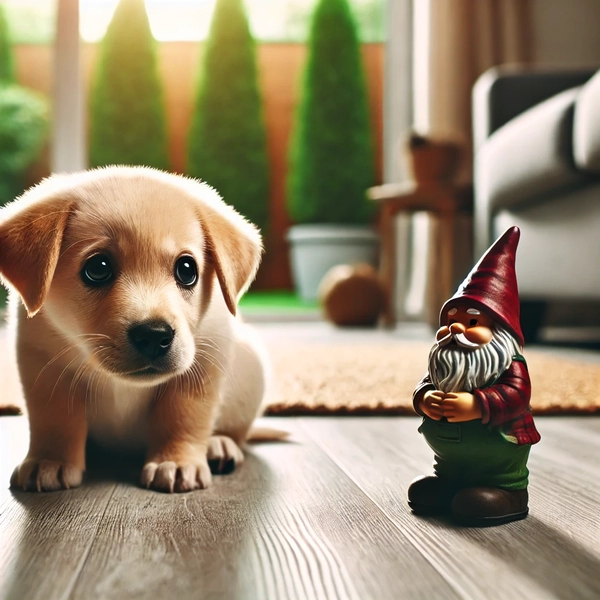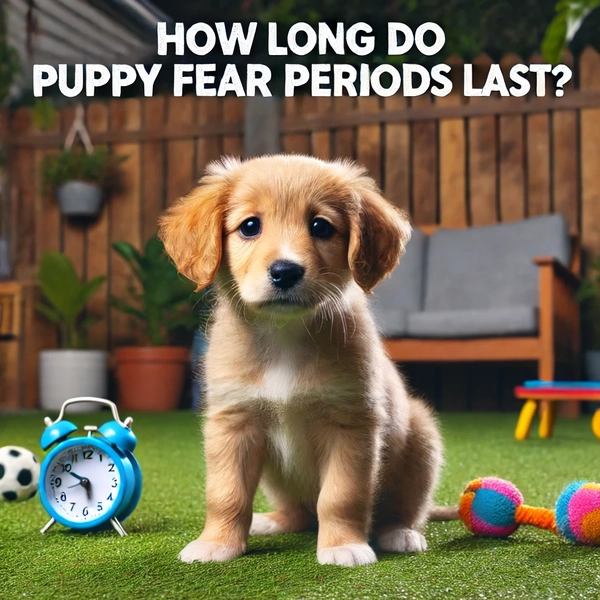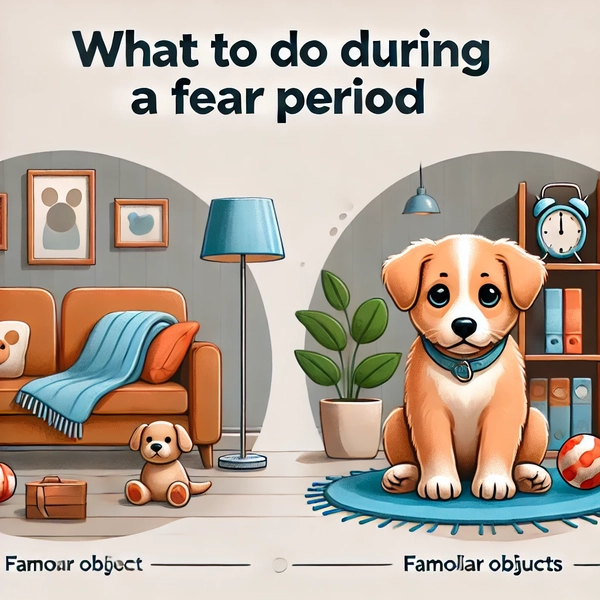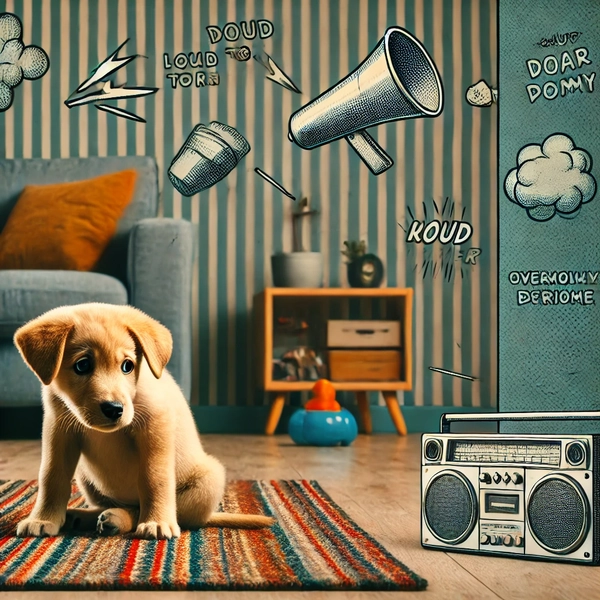How long do puppy fear periods last? Knowing which period is free from fears in a puppy is critical in bringing up a well-adjusted and confident dog. Reactions to fear in puppies are abnormal, and bracing pets is done over sensitive or excessive emotion, which is expected in ardent fans.
These are simply changes that occur during the growth and development of your puppy. So, how much time will these stages last? And what can you do to make your puppy avoid these lasting stages? Let’s sort it all out.
What is a Fear Period for Puppies?

During this period, puppies become more anxious than calm. It’s not because they are scared; it is just their stage of mind development.
Pupils are almost always babies who do not know much about the world, so they become overly cautious sometimes.
At What Age Do Puppies Go Through Fear Periods?
There are two seasons in the life of a pup within which it will experience a fear period:
- First Fear Period (Between 8-11 Weeks)
- Second Fear Period (Between 6-14 Months)
This time frame may be different since every puppy is an individual. Therefore, they will deepen those fear periods.
| Fear Period | Age Range | Duration |
| First Fear Period | 8-11 weeks | A few days to a week |
| Second Fear Period | 6-14 months | 2-3 weeks |
How Long Do Puppy Fear Periods Last?

For puppies, the start is any period of extra fear they exhibit, which is incremental and varying. Most often, however, young puppies tend to have two distinct fear periods within their growing age.
The First is the Fear Period. That is 8 to 11 Weeks
Generally, puppies’ first fear stage occurs around 8 to 11 weeks. The peppers are young and still struggling to figure out the world around them. At this stage, everything is a first for them!
How Long Does It Last? This time frame can last from a couple of days to a maximum of three or four days. However, This phase is relatively short and is most puppies in nature, but it can be highly distressing.
They may start to fear things that previously did not bother them, such as bright light or sudden noises.
Advice: Do not show your frustration and irateness in those cases. Regarding your actions, you should be as calm as possible since the little one will feel much safer.
The Second Fear Period: 6 to 14 months
Inevitably, the second fear period is what most have already illustrated—a period when growth and development are observed between 6 and 14.
This particular development stage is also known as the ‘fear period of adolescence’—when younger puppies are growing up and tend to push the boundaries a little.
How Long Does It Last? Again, This fear period can range from 2 weeks to 3 weeks, but it may seem even longer since the puppy has gained weight and increased agility at this point, and therefore, it becomes a nuisance.
At this time, they may also be frightened of other things that did not previously scare them, including people or specific places.
What to Do During a Fear Period

When it comes to the fear stage of a puppy, it is understandable to feel panic. However, you do not have to worry too much as these stages occur naturally in your puppy’s growth. Here is how you can assist:
- Keep Your Cool & Optimism
Puppy dogs read their owners’ body language. If you remain calm, the puppy will know that all is well. Speak using a pleasant, cheerful voice. Feeling or hearing your calmness may ease their anxiety.
- Avoid Overwhelming Situations
During a fear period, don’t take your puppy to a crowded or noisy arena. If your puppy is frightened by something, do not make him/her face it immediately. Allow them to do this on their own time.
For Example, Saying that a vacuum cleaner scares your puppy is true, but do not rush him too close too quickly. Allow him to look at it from a safe distance quietly.
- Use Positive Reinforcement
Encourage any acts of courage in your puppy with a reward. When they face something they fear, reward them with a treat or soft voice. This way, you reward them for being adventurous.
- Create A Comfort Network
Ensure your puppy is provided with an area or a corner, a blanket, crate, or any other object that can be a refuge whenever they feel scared.
- Gradual Exposure
She manages her fears by slowly introducing herself to the objects that scare her and experiencing them systematically and gently.
This enables them to learn that those things are not harmful.
Pro Tip: Determine how you will finish this exposure. If the dog is comfortable, do not just praise the dog; add treatment.
What Not to Do During a Fear Period

Every owner is prone to making mistakes in the care of their or, indeed, any puppy when this puppy seems scared. So let’s see what is infallibly wrong:
- Don’t Force Your Puppy
Always remember not to drive your puppy onto the thing that she fears. Driving her to face the fear will only aggravate it. It’s better to allow her to take her time discovering it.
- Avoid Comforting so Much
When your puppy is afraid, it is almost automatic to want to soothe it, but if you give too much reassurance, that may make it more afraid.
Instead, behave normally and confidently so your puppy knows nothing to be concerned about.
- Do Not Punish for Showing Fear
For example, punishing a puppy who is barking or hiding does not help. It only encourages them to scope out the future and understand that if they are scared, there will be consequences that bring them fear.
How to Help Your Puppy Build Confidence
It is natural for puppies to have emotional problems where confidence is lacking. Here are various activities that you can engage in to help your puppy gain confidence :
Socializing
While they are still very young, let your puppy meet new people and animals and visit new places.
This will prove to them that there is nothing wrong with new things. You can make socializing enjoyable with some tasty treats and/or praise.
Training
It is not enough to train your puppy to sit and stay; this also helps them gain confidence. Training in commands such as “Sit,” “Stay,” and ‘Come” gives them comfort as they understand what is required of them.
Entertainment
Playing is another excellent way of improving one’s self-esteem. Bones, fetch balls, and tug-of-war teach your puppy that seeking out the world outside can be fun
Curriculum Activities
Create and follow a daily schedule so that your puppy can know what will happen at a given time.
This gives them a sense of assurance as they understand that certain things, such as feeding, walks, or even sleeping, occur after a certain period.
How Long Will It Last In A Puppy?
Fear periods can seem protracted, but remember, these are only passing phases. Most puppies tend to overcome these phases as they grow older and bolder.
There is a range for each, but in general, once they turn one year old or older, most of those puppy fears will have diminished.
People also ask, “Are puppies scared after 6 months?” Older puppies may also display some fear or anxiety traits. Reinforcement and training help most dogs in the end.
Quick Tips for Managing Puppy Fear Periods
Here are some tips to help you remember what to do during these fear periods for your puppy:
| What to Do | What Not to Do |
| Stay calm and positive | Don’t punish or scold |
| Avoid overwhelming situations | Don’t force or push them |
| Use positive reinforcement | Don’t over-reassure |
| Provide a safe space | Don’t expose them too quickly |
Last Considerations
How long do puppy fear periods last? Such a phenomenon is natural and does not last forever. Patience and composure, combined with positive encouragement, are what you will need the most to assist your puppy during these stages.
Don’t forget that he/she relies on you for protection and leadership. By remaining calm and reassuring, you are paving the way for the development of a healthy and happy dog!
In due time and with some tolerance, we will manage through this period, and your puppy will emerge from the experience more courageous and robust.